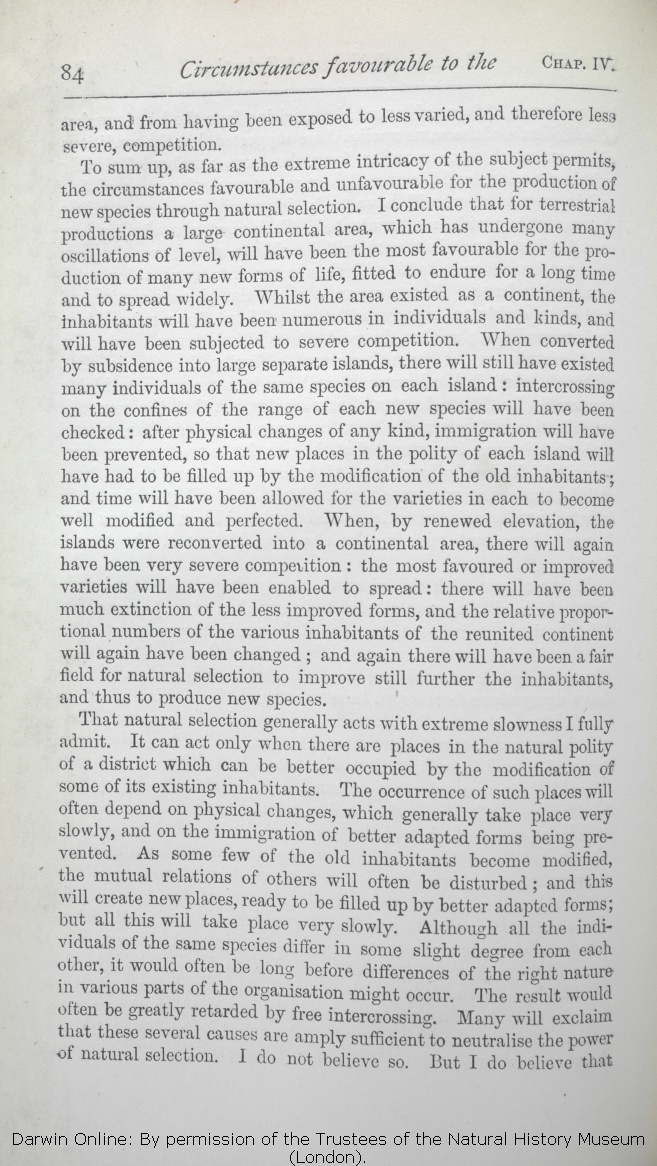To sum
up, | up, 1872 |
| up the circumstances favourable and unfavourable to natural selection, 1859 1860 1861 1866 |
| up the circumstances favourable and unfavourable for the production of new species through natural selection, 1869 |
| permits, the circumstances favourable and unfavourable for the production of new species through natural selection. 1872 |
| permits. 1859 1860 1861 1866 1869 |
| conclude 1861 1866 1869 1872 | | conclude, 1859 1860 |
| OMIT 1861 1866 1869 1872 |
| looking to the future, 1859 1860 |
| which 1859 1860 1861 1866 1872 | | which, 1869 |
| has 1861 1866 1869 1872 | | will probably 1859 1860 |
| undergone 1861 1866 1869 1872 | | undergo 1859 1860 |
| will have been 1869 1872 |
| and which consequently will exist for long periods in a broken condition, will be 1859 |
| and which consequently will exist for long periods in a broken condition, is 1860 |
| and which consequently has existed for long periods in a broken condition, has been 1861 1866 |
| fitted 1861 1866 1869 1872 | | likely 1859 1860 |
| for a long time 1869 1872 |
| long 1859 1860 1861 1866 |
| Whilst 1869 1872 | | For 1859 1860 1861 1866 |
| OMIT 1869 1872 |
| will first have 1859 |
| first 1860 1861 1866 |
| ..... 1869 1872 | | and 1859 1860 1861 1866 |
| inhabitants 1869 1872 | | inhabitants, 1859 1860 1861 1866 |
| will have been 1869 1872 |
| at this period 1859 1860 1861 1866 |
| and will 1869 1872 | | will 1859 1860 1861 1866 |
| ..... 1866 1869 1872 | | very 1859 1860 1861 |
| have existed 1861 1866 1869 1872 | | exist 1859 1860 |
| island; 1872 | | island: 1859 1860 1861 1866 1869 |
| new species will have been 1869 1872 |
| species will thus be 1859 1860 |
| species will thus have been 1861 1866 |
| checked; 1872 | | checked: 1859 1860 1861 1866 1869 |
| have been 1861 1866 1869 1872 | | be pre- 1859 1860 |
| prevented, 1861 1866 1869 1872 | | vented, 1859 1860 |
| had to 1861 1866 1869 1872 | | to 1859 1860 |
| the modification 1872 | | modifications 1859 1860 1861 1866 1869 |
| have been 1861 1866 1869 1872 | | be 1859 1860 |
| were 1861 1866 1869 1872 | | shall be 1859 1860 |
| reconverted 1861 1866 1869 1872 | | re-converted 1859 1860 |
| have been very 1872 |
| be 1859 1860 |
| have been 1861 1866 1869 |
| have been 1861 1866 1869 1872 | | be 1859 1860 |
| have been 1861 1866 1869 1872 | | be 1859 1860 |
| reunited 1869 1872 | | renewed 1859 1860 1861 1866 |
| have been 1861 1866 1869 1872 | | be 1859 1860 |
| have been 1861 1866 1869 1872 | | be 1859 1860 |
| to produce 1869 1872 | | produce 1859 1860 1861 1866 |
|
That natural selection
generally | generally 1872 | | will always 1859 1860 1861 | | always 1866 | generally 1869 |
| acts 1866 1869 1872 | | act 1859 1860 1861 |
| slowness 1861 1866 1869 1872 | | slowness, 1859 1860 |
| It can act only when there are 1872 |
| Its action depends on there being 1859 1860 1861 1866 |
| The result depends on there being 1869 |
| natural polity of a district 1872 |
| polity of nature, 1859 1860 1861 1866 1869 |
| occupied by 1859 1860 1861 1872 | | filled through 1866 1869 |
| the 1872 |
| some of the inhabitants of the country undergoing 1859 1860 1861 |
| some of the inhabitants of the country under- going 1866 |
| some of the inhabitants of the country under-going 1869 |
| modification 1859 1860 1861 1866 1872 | | modifications 1869 |
| of its existing inhabitants. 1872 |
| kind. 1859 1860 1861 1866 1869 |
| 1 blocks not present in 1872; present in 1859 1860 1861 1866 1869 | | The existence of such places will often depend on physical changes, which are generally very slow, and on the immigration of better adapted forms having been
checked.
|
| in some slight degree 1872 |
| more or less 1869 |
| it would often be long before 1872 |
| OMIT 1869 |
| in various parts of the organisation might 1872 |
| better adapted to the then existing conditions, may not soon 1869 |
| intercrossing. 1872 | | inter-crossing. 1869 |
| ..... 1869 1872 | | wholly 1859 1860 1861 1866 |
| neutralise 1869 1872 | | stop 1859 1860 1861 1866 |
| power 1869 1872 | | action 1859 1860 1861 1866 |
| But 1869 1872 |
| On the other hand, 1859 1860 1861 1866 |
|









